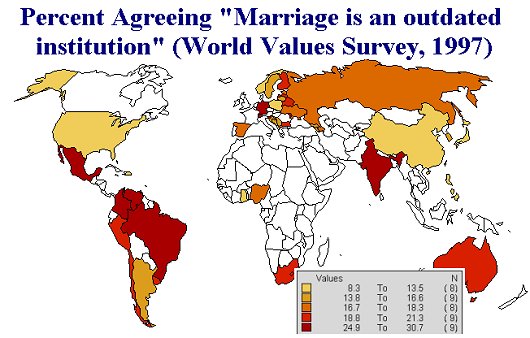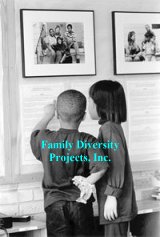- Lecture by Alan Macfarlane on Descent "What does descent mean? What is the distinction between social and biological descent?"
- The Family in Ancient Rome
- History of Marriage and Family an online course
- Lynn Nelson's "The Family Through Time", chapter 11 of Sociology in Global Perspective
- See "Marriage" and "Women at Home" subsections of Paul Halsall's Internet Medieval Sourcebook
- Abstracts of The History of the Family: An International Quarterly
- Such idealizations are typically false historically. When patriarchy reigned there were, for instance, highly stratified gender spheres during Victorian times and perhaps greater child "abuse" during colonial times. In Puritan New England, for instance, parents usually sent their children away to the home of relatives or friends as a method of discipline and a way to prevent the parents from becoming too emotionally tied to their children and from spoiling them.
- Given the interrelationships between family structures and processes with broader socio-historical phenomena, past forms--even if true--are inappropriate for present times.
- These idealizations deny the diversity and flexibility of "successful" family forms.
- Such idealizations can lead to false expectations and standards against which to gauge our current family lives.
- Stephanie Coontz's The Way We Never Were
- John R. Gillis's A World of Their Own Making observes how it "was not until the Victorian age that Western cultures began to associate paradise with origins rather than with destinations and to transform the past, particularly childhoods past, into an ideal."
- Currier and Ives "The Happy Family" (Museum of NYC exhibit)
- The Daguerreian Society and the Daguerreotype
- Images from Prof. Robin Love's Concepts of Childhood Page
- Randall Hillebrand's "The Oneida Community"
- Images of Oneida from Syracuse University
- "Old Mansion Memories," by Harriet Worden, who was raised in the community
- Gender
- Matters of Age
- And, of course, matters of sexuality. A good site to begin with is Dennis O'Neil's Sex & Marriage: An Introduction to the Cultural Rules Regulating Sexual Access and Marriage.
- in the early 1990s, sixty-one percent of all adults are wed, compared with 72 percent in 1970;
- in 1970, 85 percent of children under 18 lived with two parents, compared to only 72 percent currently. Divorce caused 37 percent of the one-parent situations, and in one-third of the one-parent homes the parent has never married;
- the number of households in which a married couple lived with young children was 26 percent of the total in 1990, down from 40 percent in 1970;
- the "traditional" nuclear family, with a husband wage-earner, wife homemaker and dependent children, now accounts for less than 10 percent of all American households;
- 45 percent of American families headed by a single mother live in poverty;
- 65 percent of black children live in a family headed by a single mother, and that a black child born today has an 87 percent chance of spending some years in a single- parent home.
- Marital Status and Living Arrangements Data from the Census
- NORC 1999 report “The Emerging 21st-Century American Family”
- Average number of own children under 18 by family type:1955 to present
- African-American Population Statistics
![]()
THE MYTH OF SOME "GOLDEN AGE" IN FAMILY LIFE
In this era of rampant divorce, reports of family violence, and dramatic change in family roles and role relations, many reflect nostalgically back to "the good old days" of family life when, supposedly, familial bonds were richer and familial processes were less likely to be "dysfunctional."
Among the fallacies and dangers of such envisionments, members of this class
observed:
In his Family Discussions: Sociological Perspectives of Changing Families site, Professor Edward J. Steffes has provided excellent reviews of the following influential works that challenge the "supposed" history of families:
For images of nineteenth-century family life, check out:
Another window on the family past is through oral histories. Resources to check include the Federal Writers' Project's "American Life Histories," oral histories collected between 1936-1940 and now part of the Library of Congress's American Memory website. Another site is Paul Thompson's "Family Life and Work Experience Before 1918: An Oral History Research Project."
The nineteenth century was a time when there still was faith in the perfectibility of man, which was, in turn, seen accomplishable if he were to be placed in the "correct" social environment. This was an era of great social experiments. New societies required new families which required, in part, new relations between the sexes and between children and adults. Among the most interesting and long-lived of these experiments was the Oneida Commune, which featured communal property and group marriage.
CULTURAL FACTORS AFFECTING FAMILY STRUCTURES AND PROCESSES
 |
VIOLENT SOCIETIES, VIOLENT FAMILIES
![]()
THE STRUCTURE OF CONTEMPORARY FAMILIES AND HOUSEHOLDS
Over the past two decades there have been sixteen major American-family studies commissioned by the Federal Government. These studies and others have found:

Click here to see changes in American household types from 1970 to 1995.
RACIAL, ETHNIC, AND CLASS DIFFERENCES
![]()
